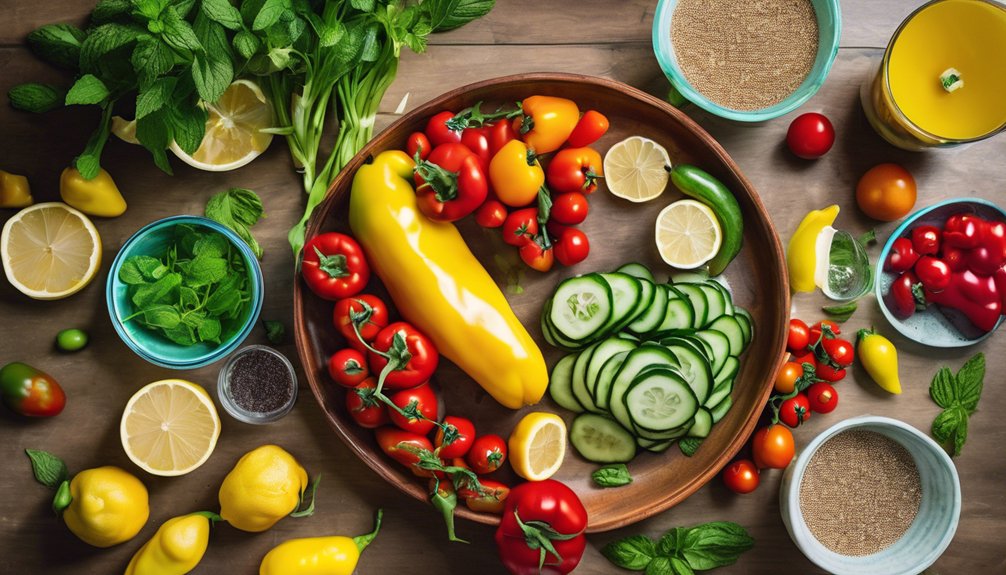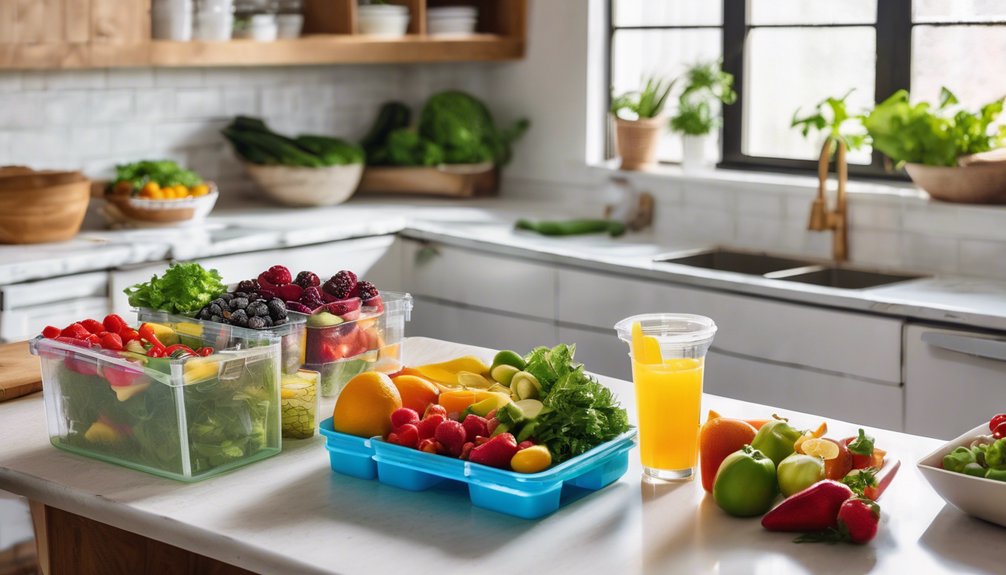Reset Your Diet in One Week
Most people underestimate the impact a one-week diet reset can have on their health and well-being. By making intentional choices and reflecting on your eating habits, you can break free from unhealthy patterns. This week-long commitment isn't just about temporary changes; it can lead to lasting lifestyle shifts. Curious about how to effectively kickstart this transformation? Let's explore the steps you can take for a successful reset.
Key Takeaways
- Reflect on your current eating habits to identify areas for improvement and triggers for unhealthy choices.
- Set realistic and achievable goals, such as adding one extra serving of vegetables each day.
- Plan meals ahead of time to ensure nutritional variety and reduce the temptation of unhealthy snacks.
- Explore new foods and recipes to foster a healthier relationship with food and enhance your diet.
- Implement strategies to overcome cravings, like deep breathing or engaging in hobbies to distract from emotional eating.
Understanding the Importance of a Diet Reset
When you feel stuck in unhealthy eating patterns, a diet reset can be a game changer. It allows you to break free from restrictive habits and embrace diet flexibility.
By focusing on nutrient variety, you're not just avoiding boredom; you're also ensuring your body receives essential vitamins and minerals. A reset encourages you to explore new foods and recipes, making healthy eating enjoyable rather than a chore.
It's an opportunity to listen to your body's needs and preferences, fostering a healthier relationship with food. This process can also boost your energy levels and mood, enhancing your overall well-being.
Assessing Your Current Eating Habits
How often do you take a moment to evaluate what you eat? Understanding your current habits is crucial for making lasting changes.
Start by reflecting on your food choices and portion sizes. Are you aware of how lifestyle factors, like stress or social situations, influence your eating patterns? Emotional eating can lead to unintentional snacking or overindulgence, so it's essential to identify triggers.
Consider the dining environments you frequent—do they promote healthy eating or tempt you with unhealthy options? Food journaling can be a valuable tool to track your meals and enhance your nutritional knowledge.
Setting Realistic Goals for the Week
As you embark on resetting your diet, setting realistic goals for the week is essential for maintaining motivation and achieving long-term success.
Begin by establishing realistic expectations; instead of aiming for drastic changes, focus on small, achievable milestones. For instance, aim to incorporate one extra serving of vegetables daily or swap sugary snacks for healthier options.
These small adjustments can lead to significant improvements over time. Keep track of your progress, and celebrate each milestone, no matter how minor it seems. This practice reinforces positive behavior and helps you stay committed.
The Power of Meal Planning
Meal planning can be a game changer in your journey to reset your diet, making it easier to stick to your goals and make healthier choices.
By dedicating time to meal prep, you're not just saving time during the week; you're ensuring you get the nutritional variety your body craves.
When you plan your meals, you can thoughtfully include different food groups, helping to prevent boredom and cravings that can derail your efforts.
Plus, having healthy meals ready to go reduces the temptation to grab unhealthy snacks or options when you're pressed for time.
Embrace the power of meal planning, and you'll find it easier to stay on track, enjoy your food, and nourish your body effectively.
Stocking Your Kitchen With Healthy Foods
To successfully reset your diet, stocking your kitchen with healthy foods is essential. Start by choosing whole, unprocessed items like fruits, vegetables, lean proteins, and whole grains.
Remember, healthy snacks can be your best allies—opt for nuts, yogurt, or hummus with veggies to satisfy cravings without guilt.
Next, focus on pantry organization. Clear out unhealthy options, making space for your nutritious staples.
Group similar foods together, like grains on one shelf and canned goods on another, so you can easily find what you need.
Keep healthy snacks within reach to encourage better choices.
Creating a Balanced Daily Meal Plan
While planning your daily meals, it's crucial to ensure each one is balanced and nutritious.
Focus on meal variety and portion control to keep your diet enjoyable and effective. Here's a simple framework you can follow:
- Breakfast: Start with whole grains, like oatmeal, topped with fresh fruit and nuts.
- Lunch: Opt for a lean protein source, such as grilled chicken, paired with a colorful salad and a whole-grain roll.
- Snack: Choose a handful of almonds or a piece of fruit to keep your energy up.
- Dinner: Prepare a serving of fish or tofu, accompanied by steamed vegetables and quinoa.
Incorporating Mindful Eating Practices
Incorporating mindful eating practices can significantly enhance your relationship with food and improve your overall well-being. By creating mindful moments during meals, you'll cultivate awareness of your body's hunger cues and make conscious choices that nourish you. Start by slowing down, savoring each bite, and appreciating the flavors and textures of your food.
Here's a simple guide to help you practice mindful eating:
| Mindful Moments | Conscious Choices |
|---|---|
| Eat without distractions | Choose whole foods |
| Chew slowly | Listen to your hunger |
| Pause before seconds | Serve smaller portions |
| Reflect on feelings | Avoid emotional eating |
| Practice gratitude | Focus on nourishment |
These practices can transform your meals into enriching experiences that support your health journey.
Staying Hydrated: The Role of Water
Mindful eating goes hand in hand with staying hydrated, as proper hydration is vital for maintaining your overall health and well-being.
Here are some hydration benefits to consider:
- Enhanced Digestion: Adequate water intake helps break down food, making nutrients easier to absorb.
- Increased Energy Levels: Staying hydrated prevents fatigue, keeping you alert and active throughout the day.
- Improved Mood: Proper hydration can uplift your mood and reduce feelings of anxiety.
- Weight Management: Drinking water before meals can help control appetite, making it easier to stick to your diet.
Overcoming Cravings and Temptations
How can you effectively conquer cravings and temptations that derail your diet? Identifying your craving triggers is key. These can include stress, boredom, or even certain environments. Once you know what sets off your cravings, you can implement temptation strategies to counteract them. Here's a simple table to guide you:
| Craving Trigger | Temptation Strategy | Alternative Action |
|---|---|---|
| Stress | Deep breathing exercises | Go for a walk |
| Boredom | Mindful eating | Engage in a hobby |
| Social situations | Plan ahead with healthy snacks | Focus on conversation |
Maintaining Your Progress Beyond the Week
After successfully overcoming cravings and temptations, the next step is to focus on maintaining your progress beyond the week.
To ensure you stay on track, consider these strategies:
- Set realistic goals: Break your long-term objectives into smaller, achievable milestones.
- Track your progress: Use a journal or app to monitor your food intake and emotional triggers, helping you reflect on your journey.
- Sustain motivation: Surround yourself with supportive friends or join a community that shares your goals, keeping your enthusiasm alive.
- Plan meals ahead: Prepare healthy meals for the week to avoid last-minute unhealthy choices.
Frequently Asked Questions
Can I Still Enjoy My Favorite Foods During a Diet Reset?
Absolutely, you can enjoy your favorite foods! By making mindful indulgence choices and incorporating food swaps, you'll satisfy cravings without derailing your goals. Balance is key, so savor what you love in moderation.
What Are Some Quick Snacks to Include in My Diet Reset?
For quick snacks, try healthy options like Greek yogurt with berries, hummus with veggies, or nut butter on apple slices. These easy recipes satisfy cravings and keep your energy up throughout the day. You'll love them!
How Do I Handle Social Situations While Resetting My Diet?
During social gatherings, focus on mindful eating. Choose smaller portions, savor each bite, and engage in conversations. Don't hesitate to communicate your dietary goals; friends often support your journey, making it easier to stay on track.
Are There Specific Supplements That Can Support My Diet Reset?
You might think you don't need supplements, but probiotics can enhance digestion and protein powders support muscle recovery. Both can be very beneficial, helping you feel more balanced and energized during your dietary changes.
How Can I Track My Progress During the Diet Reset Week?
To track your progress, start progress journaling daily. Note your meals, feelings, and energy levels. Combine this with weight tracking each morning to monitor changes effectively, helping you stay motivated and accountable throughout your journey.
Conclusion
Resetting your diet in just one week isn't just a temporary fix—it's a foundation for lasting change. You might worry that a week isn't enough time to see real results, but even small adjustments can lead to significant improvements in your energy and well-being. By committing to this reset, you'll learn to make healthier choices and develop sustainable habits. Remember, it's all about progress, not perfection. Embrace the journey, and your future self will thank you!










